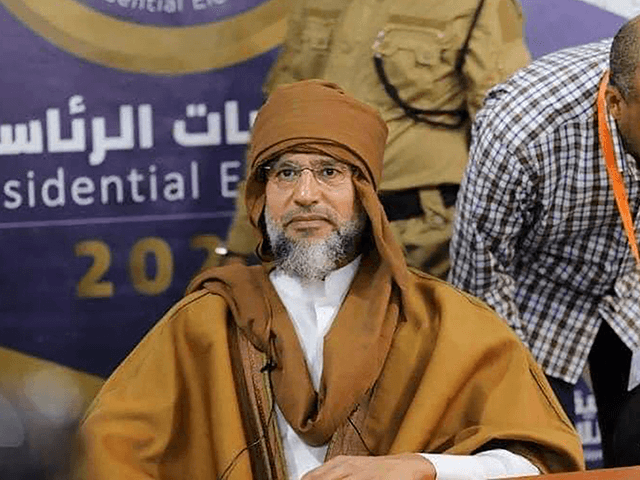Seif al-Islam Qaddafi, son of deposed and slain Libyan dictator Muammar Qaddafi, filed the paperwork on Sunday to stand as a presidential candidate in Libya’s presidential election next month.
It was the younger Qaddafi’s first public appearance in years. He was captured during the 2011 civil war that overthrew his father, sentenced to death for war crimes, and released after six years. He is still wanted by the International Criminal Court (ICC) for crimes against humanity.
Seif al-Islam, whose name means “Sword of Islam,” was actually seen as a youthful reformist leader during the latter years of his father’s reign. He became a key figure in negotiations with foreign powers, including the talks that persuaded the Qaddafi regime to abandon its quest for nuclear weapons.
Many of his admirers were dismayed when he emerged as a fiery defender of Moammar Qaddafi’s despotic rule during the 2011 uprisings, appearing on state television to swear bloody revenge against rebels and traitors.
Video: Saif Al-Islam #Gaddafi files his presidential #elections candidacy at HNEC center in Sabha in south #Libya pic.twitter.com/eC8QGlNRIn
— Libya Alahrar (@LibyaalahrarEN) November 14, 2021
The ICC, which declined to comment on Seif al-Islam’s presidential campaign announcement, seeks to prosecute him for the “murder and persecution” of Moammar Qaddafi’s political opponents. An ICC official said on Monday the warrant for Seif’s arrest is still active.
Seif had the good fortune to be captured after the fall of Muammar Qaddafi by an independent militia that did not recognize the Tripoli government’s death sentence against him. When he told the New York Times in July that he planned a political comeback, he was confident all of his domestic and international legal problems could be “negotiated away” if the Libyan people chose him as a leader.
Reuters on Sunday judged Seif to be “one of the most prominent – and controversial – figures expected to run for president,” which is really saying something since another prospective candidate is Khalifa Haftar, the warlord who laid siege to Tripoli a few years ago.
The BBC suspected “memories in Libya are likely still too raw for him to win the presidency,” but warned his candidacy will attract enough support and controversy to “further complicate the already fragile electoral process.” Muammar Qaddafi invested great effort in cultivating tribal allegiances to maintain power and many of those connections will have been passed along to his son.
Seif showed up at a High National Electoral Commission office in the southern Libyan city of Sebha to register, clad in a traditional Libyan robe and turban, reciting phrases from the Quran such as “Allah always prevails in his purpose, even if the unbelievers hate it.”
“If nothing else, Seif has inherited his father’s sense of theater,” the NYT opined in its July interview.
The Libyan presidential election is scheduled for December 24, although the Financial Times wondered on Monday if Seif al-Islam Qaddafi’s entry might cause enough unrest to scuttle the election entirely:
Wolfram Lacher, Libya analyst at the German Institute for International and Security Affairs, said Saif al-Islam’s candidacy could spur other powerful figures and would-be candidates who are seeking to postpone or scuttle the election to intensify their efforts. There are disputes between political forces in eastern and western Libya over the legal framework governing the poll — something that could signal that the losing side will refuse to accept the results.
“A big part of the opposition to the poll from political forces, especially in western Libya, is that Saif, or Khalifa Haftar [the strongman controlling eastern Libya] would win,” said Lacher. “There are also those politicians who are resisting the election because they want to hold on to their posts. I expect calls for a boycott of the election to get louder now.”
On the other hand, Lacher thought Qaddafi might fade quickly once he begins speaking to the electorate: “No one really knows what he stands for today. For years he has been that figure on which people projected their hopes without his leading any sort of project.”
“Those who believe in the possibility of Libya’s returning to the era of dictatorship after all these sacrifices, are delusional,” Libyan legislator Abdel-Rahman el-Swahili scoffed in a Facebook post quoted by the Associated Press (AP).
“A group of elders and militia leaders in the western town of Zawiya also announced their rejection of the candidacies of Seif al-Islam and Hifter, warning about the return of civil war. They threatened in a statement to shut polling stations if the elections proceeded with the current laws,” the AP reported.

COMMENTS
Please let us know if you're having issues with commenting.